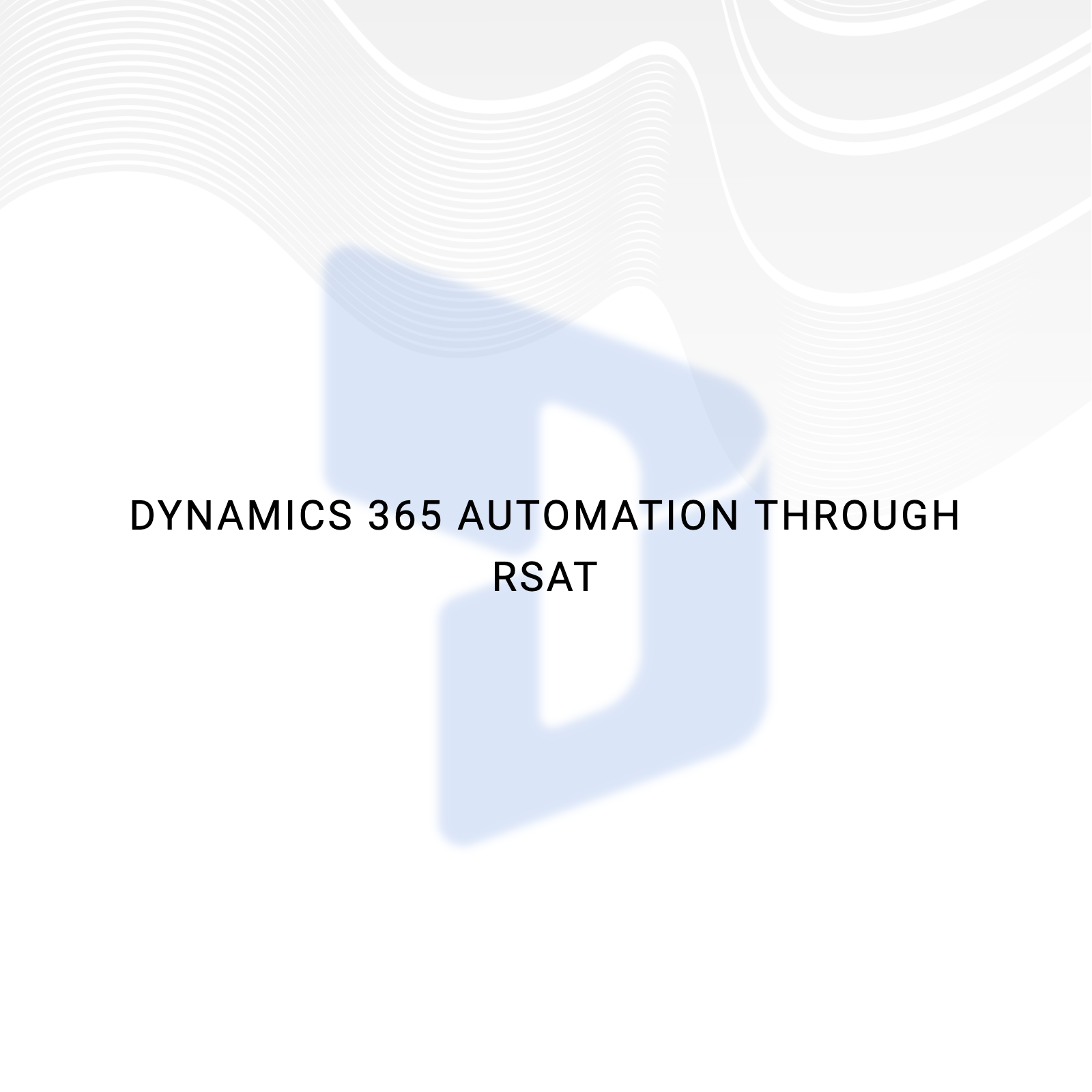Dynamics 365 automation through RSAT
Tue Aug 13 2024

About Dynamics 365
Blooming as well as established businesses with higher footfall finds it difficult to keep the customer happy by providing the required attention, efficient order conversion, and resource tracking. An efficient ERP & CRM system is essential for a better customer experience and that is where Microsoft Dynamics 365 comes into play. It is a combination of both Enterprise Resource Planning (ERP) software and Customer Relationship Management (CRM) software. It brings agility into business and reduces complexity with the power of an intelligent set of business applications that provide superior operational efficiency and better customer experiences.
Need for RSAT
User acceptance testing (UAT) is typically required before taking a Microsoft application update or applying custom code and configurations to your Dynamics 365 for Finance and Operations production environment. UAT is a type of testing performed by the end-user or the client to verify/accept the software system before moving the software application to the production environment. Once the application is moved to production, it needs to be maintained by verifying the basic functional scenarios on every deployment build which takes more manual effort unless it is automated. To reduce the humongous effort required for UAT, the widely sought-after solution is the Regression Suite Automation Tool (RSAT).
Overview of RSAT
The Regression Suite Automation Tool (RSAT) significantly reduces the time and cost of user acceptance testing. User acceptance testing is typically required before taking a Microsoft application update or applying custom code and configurations to your Dynamics 365 for Finance and Operations production environment.
It enables functional power users to record business tasks using the Finance and Operations task recorder and convert them into a suite of automated tests without the need to write source code. Test libraries are stored and distributed in Lifecycle services using the Business Process Modeler (BPM) libraries and fully integrated with Azure DevOps Services (Azure DevOps) for test execution, reporting, and investigation. Test parameters are decoupled from test steps and stored in Microsoft Excel files.
End-to-End Flow
This tool is part of the end-to-end flow described below. Finance and Operations, along with LCS and Azure DevOps, provide a set of tools for test case authoring (using a task recorder), configuration, execution, investigation, and reporting.

Get familiar with this process by reading this topic: (Create and automate user acceptance tests – Finance & Operations | Dynamics 365 | Microsoft Learn)
Note
Using Lifecycle Services (and BPM) is recommended but not mandatory. You can manually create test cases in Azure DevOps and attach developer recording files to your Azure DevOps test cases. Developer recording files can be created directly from the task recorder pane in Finance and Operations.

You must name a recording file Recording.xml before attaching it to an Azure DevOps test case.

Intended Usage and Test Classification
The Regression Suite Automation Tool is intended to be used for business cycle tests and some integration tests that usually occur at the end of the development lifecycle, sometimes referred to as user acceptance testing.
Business cycle testing consists of a smaller number of test cases than integration, component, or unit testing. This is illustrated in the pyramid below.

Task Recordings and Validation of Expected Values
An important component of a test case is the validation of expected values. You can define validation parameters during the authoring of your test cases using a task recorder.
For more information on how to create task recordings and add validation, see this topic.
Some tips:
Make sure all your recordings start on the main dashboard of Finance and Operations.
Keep individual recordings short and focus on one business task, like creating a sales order for example.
Prerequisites
Dynamics 365 for Finance and Operations test environment
Your Dynamics 365 for Finance and Operations test environment must be running Platform update 15 or newer. The Regression Suite Automation Tool must have access to your Dynamics 365 for Finance and Operations test environment via a web browser.
Microsoft Excel
You need Microsoft Excel installed to generate and edit test parameters.
Azure DevOps
You must have an Azure DevOps project to store and manage your test cases, test plans, and test case results. You will need an Azure DevOps Test Manager license. For example, if you have a Visual Studio Enterprise subscription, you already have a license to Test Manager.
Limitations of RSAT
RSAT does not have support for the scenarios having file import/export (EXCEL, XML, CSV, etc) tasks which are performed mainly in the data management workspace.
RSAT does not support workflow configuration since it requires a third-party connection for its setup.
RSAT also does not support user-specific scenarios which involve user switching with multiple logins.


